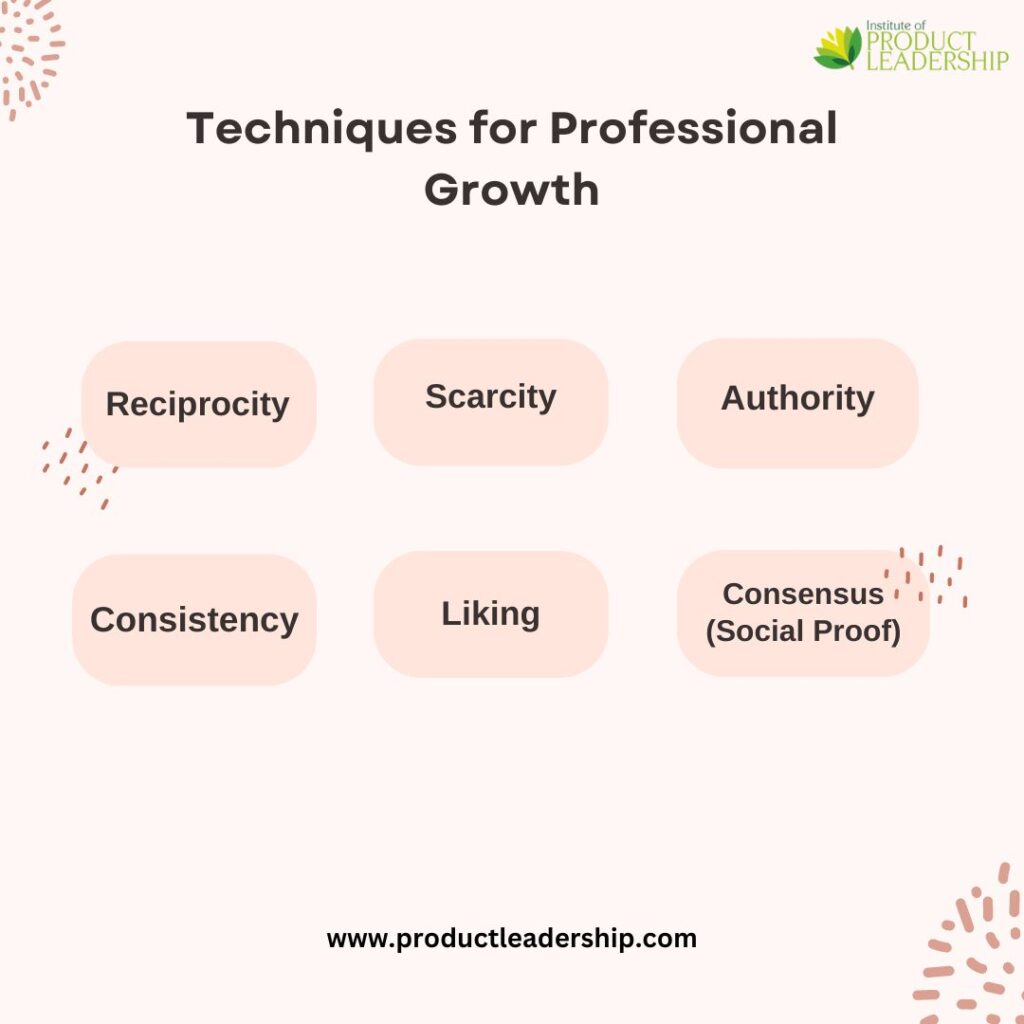Persuasion and Influence:
6 Techniques for Professional Growth
- blogs
- 5 min read
By Heera Ganjikota – Founder at Pivot Pipers Coaching & Consulting LLP
Influence and persuasion are important skills required by product managers in several roles, from negotiations to sales pitches. Understanding the psychology behind these skills can empower individuals to handle difficult situations effectively and achieve desired outcomes. In this blog, we’ll explore six techniques obtained from Dr. Robert Cialdini’s research on influence, each offering valuable insights into mastering these essential skills.
Key Takeaways:
- The principle of reciprocity suggests that people tend to give to others what has been given to them.
- The technique of using scarcity is based on the evolutionary principle that people want what they can’t have.
- The principle behind authority focuses on the fact that people naturally follow those they perceive as credible or knowledgeable or experts in a particular area.
- Linking current requests to prior commitments or values creates a sense of consistency and reinforces desired behaviors.
- We are influenced by people who like us, give us compliments, and work with us on a common goal.
- Utilizing social proof involves presenting testimonials or statistics from similar others to validate recommendations or decisions.
1. Reciprocity
The principle of reciprocity suggests that people tend to give to others what has been given to them. People think of reciprocity in terms of exchanging money or goods or services, but it involves a lot more. By offering attention, information, or respect to others, you’re likely to receive the same in return. One thing that should be taken care of is that in this process, you should be the first to give. Emphasize personalizing the gesture, and also on making it unexpected. This can significantly enhance reciprocity and give you a much higher positive influence.
2. Scarcity
This is based on the principle that people want what they can’t have. This is an evolutionary sense that has evolved over thousands of years. If there is scarcity, it means that the resource is valuable. You might have seen many advertisements that promise a sale only for a very limited time. This involves emphasizing the uniqueness and exclusivity of the sale. Utilizing these tactics can create a sense of urgency and drive action. Focus on what’s unique, the benefits, and what the customers stand to lose. Loss aversion prompts people to action much more than the benefits offered.
3. Authority
Research around authority shows that people naturally follow those they perceive as credible or knowledgeable or experts in a particular area. It makes sense especially since legitimate credible authorities have attained those positions by a lot of knowledge, skill, and expertise in the field. It’s been found that if somebody comes and tells about your expertise to others, that’s much more effective and it’s been seen to create that aura of credibility a lot more as compared to you giving your introduction yourself. Hence, testimonials or introductions from credible sources can enhance perceived authority and influence.
4. Consistency
Consistency is key to influencing behavior. Encouraging others to commit to prior statements or actions increases the likelihood of follow-through. Linking current requests to prior commitments or values creates a sense of consistency and reinforces desired behaviors. When negotiating you can activate this consistency principle by recognizing a prior commitment and linking it to your current request
5. Liking
People are more easily influenced by those they like. 3 important factors contribute people to like us. The first is similarity. We like people who are similar to us. The second is, that we like people who give us compliments. Third, we like people who cooperate and work with us on mutual goals. Building rapport and finding common ground with counterparts fosters positive relationships and enhances influence. Genuine shared interests and mutual goals contribute to likability and facilitate effective negotiations.
6. Consensus (Social Proof)
Humans tend to rely on others for clues on how to think, feel, and act, especially in uncertain situations. This comes from our evolutionary biology of wanting to be like other people because the other people have survived. So you might also think that if you follow the group, you might survive as well. Utilizing social proof involves presenting testimonials or statistics from similar others to validate recommendations or decisions. This tendency to look to and follow the lead of similar other people is strongest in situations when there is uncertainty or scarcity.
By incorporating these six techniques into the approach to influence and persuasion, product managers can significantly enhance their effectiveness in handling important negotiations, sales, and also various interpersonal interactions. By understanding the psychology behind these strategies and applying them strategically, they can master the art of influence and achieve their desired product outcomes with higher success.
About the Author
Heera Ganjikota – Founder at Pivot Pipers Coaching & Consulting LLP
Frequently Asked Questions
The 6 techniques used to master influence and persuasion skills are reciprocity, scarcity, authority, consistency, liking, and consensus.
The principle of reciprocity suggests that people tend to give to others what has been given to them. By offering attention, information, or respect to others, you’re likely to receive the same in return.
Good influence and persuasion skills help in exerting power over others without authority. It helps bring people on the same page. They can inspire people into action and drive business outcomes.







